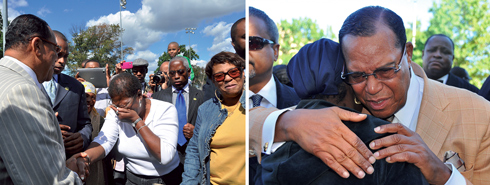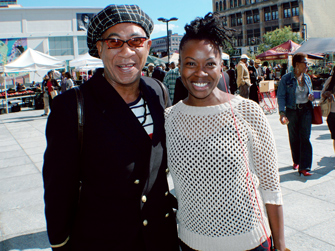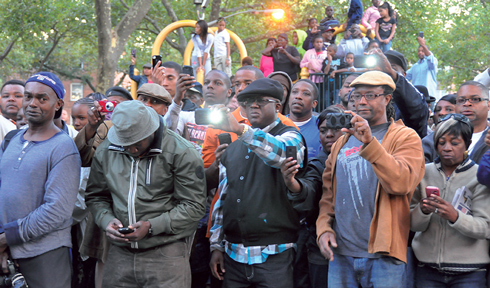
HARLEM, N.Y. (FinalCall.com) – At historic Rucker Park on 155th Street, where young players annually show off their basketball skills, Min. Louis Farrakhan greeted and consoled five mothers who lost their sons, as part of a whirlwind show-of-love tour.
“It’s a beautiful thing when you see him out here doing things for the community. And the F.O.I. I really got a good belief in them. It’s a good upbringing for Harlem right now. It’s a beautiful thing when he comes into the community because he brings people out. He’s giving a sermon where all these gang bangers and these people are messing up the community,” said Calvin Blandon, a custodian with the New York school district, after hearing the Minister speak in the Black Mecca.
“So we need a teacher; we need someone to talk too (and) someone to listen … because if not we going to keep doing the same thing,” he said.
Looking into the mirror and making a change was a major element of messages delivered by the Minister, whose tour ended here Sept. 25. The visit to several boroughs, and Newark, N.J., started Sept. 23 in New Rochelle, N.Y., and Mount Vernon, N.Y. The youthful 79-year-old Nation of Islam minister told large outdoor gatherings that awaited his arrival at each location Blacks suffer, not because of color, but because of a lack of knowledge.
“I think it was great that he would take the time to come up here and give the brothers some knowledge that’s desperately needed because these kids are knocking each other off,” said Kevin Greene. There is a right and wrong way to settle disagreements, he added. “They forgot the old school version. What’s wrong with (using) your hands that way at least after you get that out of the way, then you all have respect for each other. But they got these guns in play and these guns are driving everybody crazy.”
“I lost my son Aundre Hakim, 32, when he died on January 11, 2009,” said Penny Wrencher, who journeyed from Queens to Harlem to see the Minister. Her son was a victim in a triple shooting and a double homicide, Aundre and another young man were caught in a cross fire. She appreciated the Minister coming to the Big Apple’s boroughs, but couldn’t bear to visit the place in Queens when Min. Farrakhan visited. It was the same place where her son was killed.
“So I made it my business to come here to hear the Minister speak because his words are powerful. If these people really open up their ears and really listen (they) will learn that they have to stop killing each other,” she said.
The last stop on the tour was in the heart of Harlem on 125th Street in front of the State Office Building, where the Minister addressed a large crowd gathered to see him on short notice.

Mustafa Abdullah, a college professor who teaches accounting, called the Minister’s message “inspiring and relevant.” “He’s talking the talk and walking the walk. I think that (coming into the community) is a great example of what needs to be done,” said Mr. Abdullah.
Takeema Davis came upon the Minister’s lecture simply by being in the right space at the right time. “It was just a blessing to just walk up and see this. This is the jewel of Harlem,” said the college student in her final year, and single parent just evicted from her apartment.
“I am one of those women that tries to figure out where do we (as a people) start. I received everything that he (Min. Farrakhan) said and I’m so full that I’m still standing on this spot, because I have to regroup my energy–and with that I love my people.”
Amsterdam News editor Naya Arinde described the Harlem visit as “an inspiration for the people.” “I saw a lot of people who did not know he was going to be there.
The Minister has a powerful way of drawing people’s attention and his message was very, very clear,” she said. “Putting it in context, he said, White folks do what they do and have done what they’ve done, however … you cannot allow them to stop you.
“The violence we’re committing to ourselves is worse than ever before. He said what White folks have done cannot be excused, (but) we need to clean up our act, getting together, become economically savvy and sound,” said the editor for the historic Black weekly newspaper. “The Minister walked among the people, he shook their hands, he hugged them, took pictures with the people. He spoke very clearly on that (violence). And those who are in that lifestyle heard him and the victims heard him and those in the community heard him. And it’s good that he walked among the people and said, ‘How are you? Here’s a message for you. And I’m here because I love you.’ He was very clear, very compassionate and witty.”
Iesha Sekou, executive director and founder of Street Corner Resources, helped organize those who gathered in front of the State Office Building. “Rev. Al Taylor and myself actually met him in Rucker Park. There he spoke to mothers that had lost their children to gun violence. I happened to be with those mothers talking to them and consoling one who most recently lost her child.
So I thought how much of an impact it was because the mothers felt some connection, some sense of help and hope, which is what we want the mothers who are experiencing this war to feel. And I think Min. Farrakhan brought that to them. Not only that he gave them some (sense of) accomplishment around supporting each other through their difficulty, and to not forget that some things happen so other (more positive) things can happen,” she said.
Ms. Sekou continued, “What I saw was that people were so thirsty, hungry for a message, some hope… and he didn’t leave any stone unturned. He spoke to the young men, to parents about their responsibility, and that they have to actively get involved with their children.”
The Minister also spoke to Black police officers, saying just because their White counterparts do negative things to Black children, the Black officers don’t have to be abusive to prove their loyalty, she noted. “It was powerful because in the same breath he congratulated those same officers for being present and expressed the importance of having men of color in uniform.”

Street Corner Resources is a community-based organization founded to bring education, employment and training to the streets of New York.
“I think the Minister’s presence in New York at this most important time is a stroke of leadership, truly leadership to our people,” said veteran activist Viola Plummer, of the December 12th Movement. “I think the overwhelming majority of African Black people in this city respond to the Minister, whether they’re in the Nation of Islam or Black people, they accept his analysis and his leadership.
I was truly inspired by the response that the young Black people had to his presentation. They were quite attentive; you could see the nodding of heads that signified that they not only listened to him, they heard him, and you could tell that by their body language. I think it was of tremendous importance and I think that from the boroughs that he visited the cry was: ‘Stay in New York! Stay In New York!’ ”
Early that morning Min. Farrakhan visited Central High School in Newark, where he addressed over 1,000 students. They were so impressed with Min. Farrakhan’s message that they actually shouted out to him not to leave. The school principal’s father, poet and playwright Amira Baraka, formerly Leroi Jones, attended the lecture. He had nothing but praise for the timelessness of the message and the need for young people to be touched by their elders.
“I thought it was very inspirational to these kids,” said Mr. Baraka, whose son Ras invited the Minister to speak to the students. The youth felt Min Farrakhan was a “gift,” said the acclaimed writer and poet. “I know I had people intervene in my life when I was a young man like that. My English teacher was the great poet Sterling Brown. Stuff he told me I still remember, I still use. So it’s not a reach to think that these kids will be making reference (to Minister Farrakhan’s remarks),” said a man who was a stalwart of the Black Arts movement of the 1960s and 1970s.
Seventeen-year-old senior Steve Davis said the lecture was “good.” “When he (the Minister) brought up the Michael Jackson song about change and The Man In The Mirror, that was good,” said the teenager. He added that the words really impacted him to “make a change.”
“He inspired me to become a leader as I get older so I can help other people and the younger people so that they could make a better future,” said Natasha Rivera, a 17-year-old senior who is looking to become a veterinarian. Another 17-year-old senior, Othella Moody, wants to become a nurse. “His speech helped me not allow others to look down upon me. And not to ever let a man call me that word b—h,” she said.
“He really gave us something about how the real world is and what you think about … using the word b—h,” said Keith Drake. The 14-year-old ninth grader added that the Minister “was correct because that’s how it really is” and inspired him to want to stop hanging in the streets.
“Prior to his coming they had heard that Minister Farrakhan was going to be here. We told the kids who he was and lots of them didn’t know who he was. A lot of them were sort of clueless. We said what an international icon he is. Their responses included, ‘I’m Christian and he’s Muslim.’ We responded that it doesn’t make a difference, you have to listen to his message,” said physical education instructor Bruce Berry.
“Afterwards just looking into some of their faces as he was exiting, they were in awe. They heard this coming from an African American man that’s not the principal or other teachers in this building. Here’s another one really speaking this. I think it was profound, it was historical.”
Myraim Deime, an engineer from New Rochelle living in Yonkers, not only attended the New Rochelle rally, she also came to see the Minister in Mount Vernon and wanted a copy of his itinerary so she could be a part of his other New York appearances. “We always think the Minister’s message is right on point and necessary. It’s so good to see him here … it’s historical that he should be here and so up close and personal,” she said.
Charles Johnson a retired corporate middle manager from Mount Vernon expressed similar sentiments. He repeated the Minister’s words, “It ain’t going to fall out of the sky. Men and women stepping up to the challenge … that’s going to get it done.”
Min. Farrakhan left the safety of his caravan of black Suburbans and police escort to talk to, take pictures with, and embrace people–young and old–in Newark and New York. During a stop in Brooklyn at Nostrand and Fulton, he was mobbed by residents prompting one person to observe: “Rock stars ain’t got nothing on Farrakhan.” Another young Black man, seeing the caravan of black Suburbans, added, “Farrakhan rolls like the president.”












